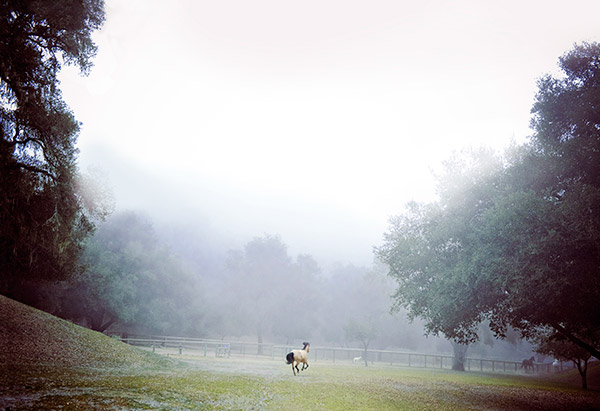Meet Your New Therapist. He's Wise, Compassionate...and Likes to Eat Hay

Photo: Phyllis Lane
PAGE 2
An equine coaching session consists of the following: You stand near a horse. You gesture to that horse. It gestures back. And you begin to feel an almost telepathic communication between you and this creature.
Koelle Simpson's life began in Hendersonville, Tennessee, where she was born to an entrepreneurial father and a mother who loved nature, animals and her children in almost equal measure. As a girl, Koelle spent hours with the horses that lived near her rural home. They were reliable, dependable, utterly incapable of deceit or unkindness—something that could not be said of all the humans in her life. Like too many children, she was preyed upon, experiencing sexual abuse that left her feeling broken. She coped by turning to horses, who have been systematically "broken" by humans for thousands of years.
At age 17, Koelle left home on a quest to learn everything she could about horses—from books, from trainers and handlers and most of all, from the animals themselves. Over time, and through thousands of interactions, she learned a skill many call horse whispering, though Koelle downplays the term's mystique. "I'm just communicating with horses in their own language," she says. "It turns out they have a lot to say that humans can really use."
I met Koelle, now 33, nine years ago. At half the age of many master horse trainers, she could already heal animals that seemed damaged beyond repair. I watched Koelle transform a horribly abused horse from a raging, kicking ball of fear to a relaxed companion that followed her everywhere. It took her only a few hours, using no whips, chains, ropes, or violence of any kind. My son Adam, who has Down syndrome, took a ride on a gentle mustang named Navajo that Koelle had rescued from euthanasia. Koelle never broke Navajo. She simply conversed with him until they understood each other.
I've since seen that Koelle can change people, too, helping them heal from abuse, anxiety, compulsions, addictions and negative patterns in careers and relationships. This may be because horses relate to humans in a uniquely fascinating way. They aren't so untamable that they can't form intimate bonds with us, but they can never be fully tamed (like, say, dogs). To connect with them, we must return to our own untamed selves. Over centuries upon centuries, each of our species has influenced the growth of the other, establishing a kinship that is practical, emotional, and more than slightly magical.
Another thing about horses: They're skittish as hell. Imagine living in the open, day and night, knowing that any predator could attack you from any angle at any moment. Because horses evolved in this scenario, they're incredibly sensitive to their environment. Their fears are many, their sense of security easily rattled.
But a horse's panicky instincts are balanced by an equally intense desire for companionship. Since a lone animal is like a walking buffet, horses desperately need one another for protection and constantly exchange social cues, giving affection, setting boundaries. Anxiety, rage, and other unsettled emotions feel dangerous to them, and they'll do whatever they can to escape such frightening energy. If that means edging away, they'll edge. If it means running, they'll run. If it means rearing, kicking, or biting, that's what they'll do. But no horse ever sets out to be violent. They lash out as a last resort—much like we do when we feel tied up and cornered by social obligation, financial pressure, the endless demands of our daily lives.
In other words, horses are very much like humans—especially women, who are less predatory, and more preyed upon, than men. Maybe this is why many girls (I was one of them) are obsessed with horses even if they've never so much as touched one. (Some Freudian analysts believe the girlish obsession with horses is sexual, interpreting the hip action of riding as a form of subconscious masturbation. To these theorists I would say, first, you have obviously never ridden a horse; and, second, for Pete's sake, there are easier ways.)
But I digress. My point is that the similarities between equine psychology and human psychology mean that interacting with horses can tap into some of our deepest emotions. Throughout history, horses have been whipped, hobbled, dragged, and otherwise tortured until they go numb to their instincts and agree to do whatever humans want. This may sound familiar. How many times have you felt the lash of disapproval, the hobbling of your heart's desires, the torture of others' expectations?
Humans who can "speak" in the gestural language horses use to communicate with one another have demonstrated that these animals are amazingly cooperative. They've also found that horses always tell you exactly what they think—and here's where things get interesting, because what horses think of you happens to be what most people think of you, too. The difference: Horses won't lie about it. Flattery, backstabbing, and hidden agendas are unknown to horses. They communicate what they feel, straight up, all the time. Which means that to gain their trust, humans must be genuine, clear, and honest. Which is why horse whispering is such a powerful psychological intervention.
Next: How an equine life coaching session starts



